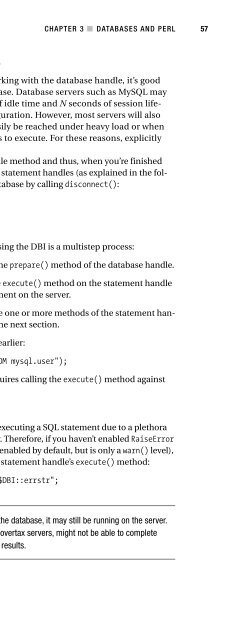- Page 3 and 4:
Beginning Web Development with Perl
- Page 5 and 6:
PART 5 ■ ■ ■ Creating Web Tem
- Page 8 and 9:
■CONTENTSvii■CHAPTER 4 System I
- Page 10 and 11:
■CONTENTSixCreating a SOAP Listen
- Page 12 and 13:
■CONTENTSxiTemplate Toolkit Synta
- Page 14 and 15:
About the Author■STEVE SUEHRING i
- Page 16 and 17:
AcknowledgmentsThanks to James Lee
- Page 18 and 19:
xx■INTRODUCTIONThis book will use
- Page 20 and 21:
CHAPTER 1■ ■ ■The CGI ModuleT
- Page 22 and 23:
CHAPTER 1 ■ THE CGI MODULE 5for t
- Page 24 and 25:
CHAPTER 1 ■ THE CGI MODULE 7Obvio
- Page 26 and 27:
CHAPTER 1 ■ THE CGI MODULE 9exit;
- Page 28 and 29:
CHAPTER 1 ■ THE CGI MODULE 11Each
- Page 30 and 31:
CHAPTER 1 ■ THE CGI MODULE 13When
- Page 32 and 33:
CHAPTER 1 ■ THE CGI MODULE 15Upda
- Page 34 and 35:
CHAPTER 1 ■ THE CGI MODULE 17rese
- Page 36 and 37:
CHAPTER 1 ■ THE CGI MODULE 19prin
- Page 38 and 39:
CHAPTER 1 ■ THE CGI MODULE 21Sett
- Page 40 and 41:
CHAPTER 1 ■ THE CGI MODULE 23You
- Page 42 and 43:
CHAPTER 1 ■ THE CGI MODULE 25■C
- Page 44 and 45:
CHAPTER 1 ■ THE CGI MODULE 27No m
- Page 46 and 47:
CHAPTER 1 ■ THE CGI MODULE 29The
- Page 48 and 49:
CHAPTER 1 ■ THE CGI MODULE 31prin
- Page 50 and 51:
CHAPTER 1 ■ THE CGI MODULE 33Also
- Page 52 and 53:
CHAPTER 2■ ■ ■Popular CGI Mod
- Page 54 and 55:
CHAPTER 2 ■ POPULAR CGI MODULES 3
- Page 56 and 57:
CHAPTER 2 ■ POPULAR CGI MODULES 3
- Page 58 and 59:
CHAPTER 2 ■ POPULAR CGI MODULES 4
- Page 60 and 61:
CHAPTER 2 ■ POPULAR CGI MODULES 4
- Page 62 and 63:
CHAPTER 2 ■ POPULAR CGI MODULES 4
- Page 64 and 65:
CHAPTER 2 ■ POPULAR CGI MODULES 4
- Page 66 and 67:
50CHAPTER 3 ■ DATABASES AND PERLT
- Page 68 and 69:
52CHAPTER 3 ■ DATABASES AND PERLm
- Page 70 and 71:
54CHAPTER 3 ■ DATABASES AND PERLl
- Page 72 and 73:
56CHAPTER 3 ■ DATABASES AND PERLc
- Page 74 and 75:
58CHAPTER 3 ■ DATABASES AND PERLR
- Page 76 and 77:
60CHAPTER 3 ■ DATABASES AND PERLm
- Page 78 and 79:
62CHAPTER 3 ■ DATABASES AND PERLw
- Page 80 and 81:
64CHAPTER 3 ■ DATABASES AND PERLA
- Page 82 and 83:
66CHAPTER 3 ■ DATABASES AND PERLm
- Page 84 and 85:
68CHAPTER 3 ■ DATABASES AND PERLm
- Page 86 and 87:
70CHAPTER 3 ■ DATABASES AND PERLT
- Page 88 and 89:
72CHAPTER 3 ■ DATABASES AND PERLT
- Page 90 and 91:
74CHAPTER 4 ■ SYSTEM INTERACTION
- Page 92 and 93:
76CHAPTER 4 ■ SYSTEM INTERACTIONt
- Page 94 and 95: 78CHAPTER 4 ■ SYSTEM INTERACTIONc
- Page 96 and 97: 80CHAPTER 4 ■ SYSTEM INTERACTIONA
- Page 98 and 99: 82CHAPTER 4 ■ SYSTEM INTERACTIONm
- Page 100 and 101: 84CHAPTER 4 ■ SYSTEM INTERACTIONs
- Page 102 and 103: 86CHAPTER 4 ■ SYSTEM INTERACTIONr
- Page 104 and 105: CHAPTER 5■ ■ ■LWP ModulesLWP
- Page 106 and 107: CHAPTER 5 ■ LWP MODULES 91HTTP Re
- Page 108 and 109: CHAPTER 5 ■ LWP MODULES 93Get Fun
- Page 110 and 111: CHAPTER 5 ■ LWP MODULES 95When ca
- Page 112 and 113: CHAPTER 5 ■ LWP MODULES 97These a
- Page 114 and 115: CHAPTER 5 ■ LWP MODULES 99Recall
- Page 116 and 117: CHAPTER 5 ■ LWP MODULES 101which
- Page 118 and 119: CHAPTER 5 ■ LWP MODULES 103For th
- Page 120 and 121: CHAPTER 5 ■ LWP MODULES 105Obviou
- Page 122 and 123: 108CHAPTER 6 ■ NET:: TOOLSCreatin
- Page 124 and 125: 110CHAPTER 6 ■ NET:: TOOLSThe out
- Page 126 and 127: 112CHAPTER 6 ■ NET:: TOOLSmy $pop
- Page 128 and 129: 114CHAPTER 6 ■ NET:: TOOLSthe POP
- Page 130 and 131: 116CHAPTER 6 ■ NET:: TOOLS($messa
- Page 132 and 133: 118CHAPTER 6 ■ NET:: TOOLSListing
- Page 134 and 135: 120CHAPTER 6 ■ NET:: TOOLSFor the
- Page 136 and 137: 122CHAPTER 6 ■ NET:: TOOLSNet::SM
- Page 138 and 139: 124CHAPTER 6 ■ NET:: TOOLS$smtpco
- Page 140 and 141: 126CHAPTER 6 ■ NET:: TOOLSuse Net
- Page 142 and 143: 128CHAPTER 6 ■ NET:: TOOLSListing
- Page 146 and 147: 132CHAPTER 6 ■ NET:: TOOLSSending
- Page 148 and 149: PART 3■ ■ ■XML and RSS
- Page 150 and 151: 138CHAPTER 7 ■ SOAP-BASED WEB SER
- Page 152 and 153: 140CHAPTER 7 ■ SOAP-BASED WEB SER
- Page 154 and 155: 142CHAPTER 7 ■ SOAP-BASED WEB SER
- Page 156 and 157: 144CHAPTER 7 ■ SOAP-BASED WEB SER
- Page 158 and 159: 146CHAPTER 7 ■ SOAP-BASED WEB SER
- Page 160 and 161: 148CHAPTER 7 ■ SOAP-BASED WEB SER
- Page 162 and 163: 150CHAPTER 7 ■ SOAP-BASED WEB SER
- Page 164 and 165: 152CHAPTER 7 ■ SOAP-BASED WEB SER
- Page 166 and 167: 154CHAPTER 8 ■ PERL AND RSSFigure
- Page 168 and 169: 156CHAPTER 8 ■ PERL AND RSShttp:/
- Page 170 and 171: 158CHAPTER 8 ■ PERL AND RSSDebugg
- Page 172 and 173: 160CHAPTER 8 ■ PERL AND RSS$rsswr
- Page 174 and 175: 162CHAPTER 8 ■ PERL AND RSSListin
- Page 176 and 177: CHAPTER 9■ ■ ■XML Parsing wit
- Page 178 and 179: CHAPTER 9 ■ XML PARSING WITH PERL
- Page 180 and 181: CHAPTER 9 ■ XML PARSING WITH PERL
- Page 182 and 183: CHAPTER 9 ■ XML PARSING WITH PERL
- Page 184 and 185: CHAPTER 9 ■ XML PARSING WITH PERL
- Page 186 and 187: CHAPTER 9 ■ XML PARSING WITH PERL
- Page 188 and 189: CHAPTER 9 ■ XML PARSING WITH PERL
- Page 190 and 191: CHAPTER 9 ■ XML PARSING WITH PERL
- Page 192 and 193: PART 4■ ■ ■PerformanceEnhance
- Page 194 and 195:
184CHAPTER 10 ■ APACHE AND MOD_PE
- Page 196 and 197:
186CHAPTER 10 ■ APACHE AND MOD_PE
- Page 198 and 199:
188CHAPTER 10 ■ APACHE AND MOD_PE
- Page 200 and 201:
190CHAPTER 10 ■ APACHE AND MOD_PE
- Page 202 and 203:
192CHAPTER 10 ■ APACHE AND MOD_PE
- Page 204 and 205:
194CHAPTER 10 ■ APACHE AND MOD_PE
- Page 206 and 207:
196CHAPTER 10 ■ APACHE AND MOD_PE
- Page 208 and 209:
198CHAPTER 10 ■ APACHE AND MOD_PE
- Page 210 and 211:
200CHAPTER 10 ■ APACHE AND MOD_PE
- Page 212 and 213:
202CHAPTER 11 ■ DEVELOPMENT WITH
- Page 214 and 215:
204CHAPTER 11 ■ DEVELOPMENT WITH
- Page 216 and 217:
206CHAPTER 11 ■ DEVELOPMENT WITH
- Page 218 and 219:
208CHAPTER 11 ■ DEVELOPMENT WITH
- Page 220 and 221:
210CHAPTER 11 ■ DEVELOPMENT WITH
- Page 222 and 223:
212CHAPTER 11 ■ DEVELOPMENT WITH
- Page 224 and 225:
214CHAPTER 11 ■ DEVELOPMENT WITH
- Page 226 and 227:
216CHAPTER 11 ■ DEVELOPMENT WITH
- Page 228 and 229:
218CHAPTER 11 ■ DEVELOPMENT WITH
- Page 230 and 231:
220CHAPTER 11 ■ DEVELOPMENT WITH
- Page 232 and 233:
222CHAPTER 11 ■ DEVELOPMENT WITH
- Page 234 and 235:
224CHAPTER 11 ■ DEVELOPMENT WITH
- Page 236 and 237:
226CHAPTER 11 ■ DEVELOPMENT WITH
- Page 238 and 239:
228CHAPTER 11 ■ DEVELOPMENT WITH
- Page 240 and 241:
230CHAPTER 11 ■ DEVELOPMENT WITH
- Page 242 and 243:
CHAPTER 12■ ■ ■The Template T
- Page 244 and 245:
CHAPTER 12 ■ THE TEMPLATE TOOLKIT
- Page 246 and 247:
CHAPTER 12 ■ THE TEMPLATE TOOLKIT
- Page 248 and 249:
CHAPTER 12 ■ THE TEMPLATE TOOLKIT
- Page 250 and 251:
CHAPTER 12 ■ THE TEMPLATE TOOLKIT
- Page 252 and 253:
CHAPTER 12 ■ THE TEMPLATE TOOLKIT
- Page 254 and 255:
CHAPTER 12 ■ THE TEMPLATE TOOLKIT
- Page 256 and 257:
CHAPTER 12 ■ THE TEMPLATE TOOLKIT
- Page 258 and 259:
CHAPTER 12 ■ THE TEMPLATE TOOLKIT
- Page 260 and 261:
CHAPTER 12 ■ THE TEMPLATE TOOLKIT
- Page 262 and 263:
CHAPTER 12 ■ THE TEMPLATE TOOLKIT
- Page 264 and 265:
CHAPTER 12 ■ THE TEMPLATE TOOLKIT
- Page 266 and 267:
CHAPTER 12 ■ THE TEMPLATE TOOLKIT
- Page 268 and 269:
CHAPTER 12 ■ THE TEMPLATE TOOLKIT
- Page 270 and 271:
CHAPTER 12 ■ THE TEMPLATE TOOLKIT
- Page 272 and 273:
CHAPTER 13■ ■ ■Perl Web Sites
- Page 274 and 275:
CHAPTER 13 ■ PERL WEB SITES WITH
- Page 276 and 277:
CHAPTER 13 ■ PERL WEB SITES WITH
- Page 278 and 279:
CHAPTER 13 ■ PERL WEB SITES WITH
- Page 280 and 281:
CHAPTER 13 ■ PERL WEB SITES WITH
- Page 282 and 283:
CHAPTER 13 ■ PERL WEB SITES WITH
- Page 284 and 285:
CHAPTER 13 ■ PERL WEB SITES WITH
- Page 286 and 287:
CHAPTER 13 ■ PERL WEB SITES WITH
- Page 288 and 289:
CHAPTER 13 ■ PERL WEB SITES WITH
- Page 290 and 291:
CHAPTER 13 ■ PERL WEB SITES WITH
- Page 292 and 293:
284APPENDIX ■ PERL BASICSKeywords
- Page 294 and 295:
286APPENDIX ■ PERL BASICS$ perl n
- Page 296 and 297:
288APPENDIX ■ PERL BASICSAnd line
- Page 298 and 299:
290APPENDIX ■ PERL BASICSCan you
- Page 300 and 301:
292APPENDIX ■ PERL BASICSBy defau
- Page 302 and 303:
294APPENDIX ■ PERL BASICS#!/usr/b
- Page 304 and 305:
296APPENDIX ■ PERL BASICSThe last
- Page 306 and 307:
298APPENDIX ■ PERL BASICSThe NOT
- Page 308 and 309:
300APPENDIX ■ PERL BASICSprint "S
- Page 310 and 311:
302APPENDIX ■ PERL BASICSthe syst
- Page 312 and 313:
304APPENDIX ■ PERL BASICS$ perl s
- Page 314 and 315:
306APPENDIX ■ PERL BASICSThis cod
- Page 316 and 317:
308APPENDIX ■ PERL BASICS$a = 6 *
- Page 318 and 319:
310APPENDIX ■ PERL BASICS$a = "A9
- Page 320 and 321:
312APPENDIX ■ PERL BASICS#!/usr/b
- Page 322 and 323:
314APPENDIX ■ PERL BASICSmy $name
- Page 324 and 325:
316APPENDIX ■ PERL BASICSis short
- Page 326 and 327:
318APPENDIX ■ PERL BASICSLet’s
- Page 328 and 329:
320APPENDIX ■ PERL BASICSOther Te
- Page 330 and 331:
322APPENDIX ■ PERL BASICS}}}actio
- Page 332 and 333:
324APPENDIX ■ PERL BASICSNotice t
- Page 334 and 335:
326APPENDIX ■ PERL BASICSLooping
- Page 336 and 337:
328APPENDIX ■ PERL BASICSuse stri
- Page 338 and 339:
330APPENDIX ■ PERL BASICSuntil ($
- Page 340 and 341:
332APPENDIX ■ PERL BASICSuse stri
- Page 342 and 343:
334APPENDIX ■ PERL BASICSdoneAll
- Page 344 and 345:
336APPENDIX ■ PERL BASICS$ perl r
- Page 346 and 347:
338APPENDIX ■ PERL BASICSSummaryT
- Page 348 and 349:
340■INDEXmethods for retrieving r
- Page 350 and 351:
342■INDEXdo() method for, 62dumpi
- Page 352 and 353:
344■INDEXhello option for Net::SM
- Page 354 and 355:
346■INDEXNet::DNS module, 125-128
- Page 356 and 357:
348■INDEXrecord with Net::DNS mod
- Page 358 and 359:
350■INDEXstoring mail server in e
- Page 360 and 361:
352■INDEXlogging based on, 229pri
















